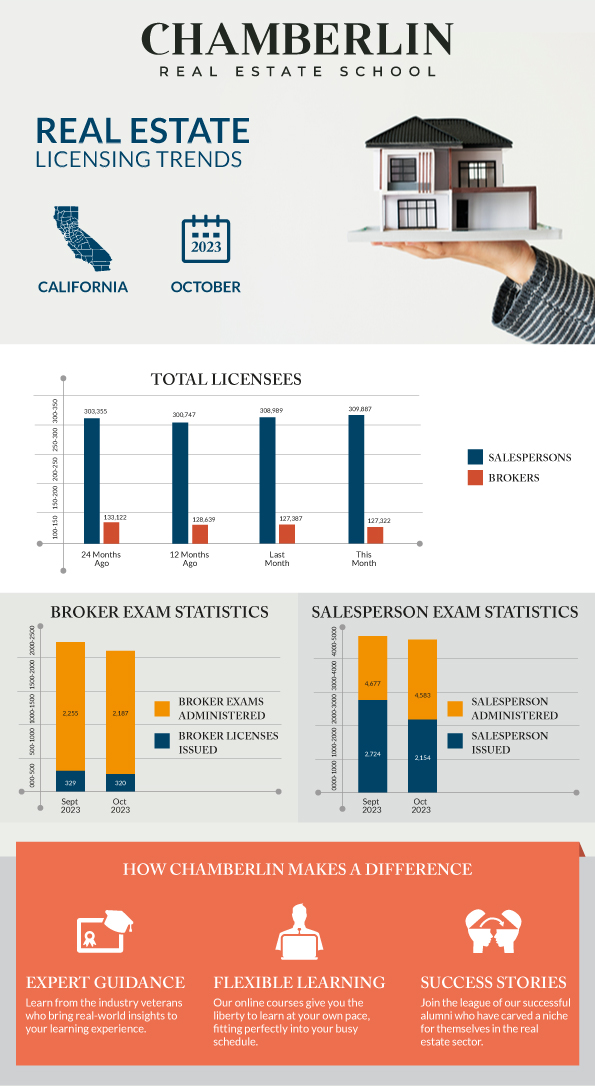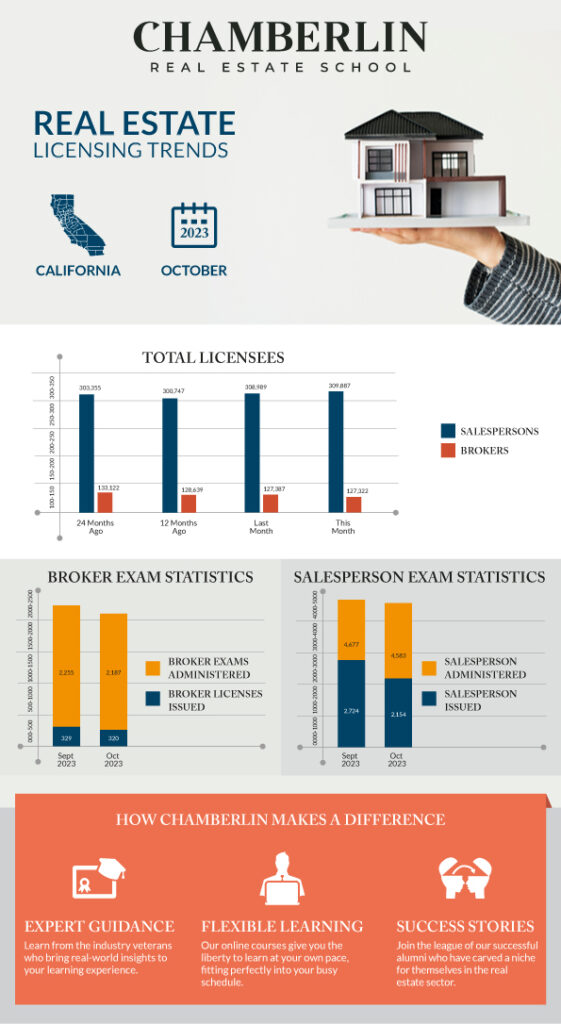The allure of California – with its sunny weather, diverse culture, and breathtaking landscapes – makes it one of the most desirable places to live. This state is a hotspot for some of the nation’s priciest and most opulent homes, attracting affluent individuals in pursuit of their perfect dwelling. For those considering diving into the luxury real estate market, familiarizing yourself with the most sought-after cities is crucial. Explore our guide on the 9 Cities In California All Aspiring Real Estate Agents Should Know In 2024. But first, you’re probably wondering: how does one become a luxury real estate agent in our state, and is it the right path for you?
Entering the realm of luxury real estate means stepping into a specialized market that demands not just a license and enthusiasm for sales but a deep comprehension of high-end clients’ needs, luxury market dynamics, and sophisticated marketing and sales techniques. It’s critical to cultivate a robust network of contacts, earn referrals, and seek guidance from mentors to elevate your status and business acumen in this elite segment.
In this guide, we’ll delve into the specifics of launching a career as a luxury real estate agent in California, assisting you in determining its suitability for your professional goals. We’ll tackle the essential topics to prepare you for the journey ahead!
Challenges of Specializing in Luxury Real Estate
Embarking on a career in luxury real estate is no small feat. This sector demands an exceptional degree of professionalism, dedication, and resilience. Here are some notable challenges professionals in the field often encounter:
- Extensive knowledge of high-end homes and communities is essential. Specialists in luxury real estate must be knowledgeable about the intricate features and amenities these properties offer. They should also understand the history behind them, the evolving market trends, the preferences of affluent buyers, and the myriad of regulations, taxes, and zoning laws that influence these grand estates.
- Luxury clients seek a white-glove service and unrivaled expertise. With sophisticated expectations, these clients demand bespoke service, sage advice, and pathways to exclusive listings. Their agents must embody discretion and trustworthiness, safeguarding client privacy at every turn.
- Unique properties necessitate innovative marketing. The distinctiveness of luxury homes—from their architectural splendor to their historical roots or sustainable features—requires a creative marketing approach. Agents must craft strategies that not only highlight the properties’ unique value but also resonate with a niche audience.
- Commissions hinge on infrequent, yet sizeable sales. Since luxury agents are compensated via commission post-sale, the stakes are high. These prestigious homes often linger on the market longer due to a limited buyer pool, mandating that agents invest more time and effort per sale, and navigate the waters of unpredictability and financial risk.
Rewards of Specializing in Luxury Real Estate
The real estate sector presents diverse paths, but choosing to concentrate on the luxury market can be both rewarding and fulfilling. Here are some of the key benefits this niche can offer:
- Access to exclusive properties in sought-after locations. Agents immersed in luxury real estate enjoy the privilege of representing some of the world’s most magnificent properties. These homes not only showcase exceptional art and craftsmanship, but also offer stunning views and upscale lifestyle options. Agents get to share their appreciation for these fine homes with their clients.
- The potential for high commissions on multi-million dollar transactions. High-end properties carry high price tags, and with commissions being a percentage of the sale, agents can earn significant sums from just a single transaction. Curious about potential earnings? Learn more about Real Estate Agent Compensation in California to understand what you can expect from your transactions.
- Opportunities to network with elite agents and wealthy clients. Networking is key in luxury real estate, where one can forge relationships with accomplished peers and influential clientele. These connections may lead to additional business opportunities and collaborations. Moreover, learning from the industry’s best practices is an invaluable aspect of these relationships.
- The chance to deliver exceptional service to discerning clients. Luxury clients are in search of top-notch service and excellence. As an agent, you can demonstrate your expertise and dedication by understanding and exceeding the unique needs and expectations of your clients, nurturing trust, and building lasting loyalty.
- Enhancing one’s status and reputation as a luxury specialist. Being recognized as an expert in luxury real estate can elevate an agent’s status within the industry. Gaining certifications, accolades, and recognition from esteemed organizations and publications adds to one’s credibility and professional visibility.
Characteristics Needed to Succeed in Luxury Real Estate
The realm of luxury real estate is both highly competitive and exacting, demanding a specialized skill set for success. It requires more than just the average agent to navigate the market of opulent homes and discerning clients. Industry leaders pinpoint several critical characteristics for those aiming to excel:
- Extensive knowledge of architecture, design, and high-end amenities is imperative. Professionals in luxury real estate must possess comprehensive insight into what constitutes a property’s luxury status. This includes an understanding of architectural styles, interior design, premium materials, cutting-edge technology, and exclusive amenities. Moreover, the ability to articulate the significance and allure of these luxury features to clients is paramount.
- Adept marketing skills are essential to effectively showcase luxury listings. Agents must be both inventive and tactical when promoting properties that typically present a challenge to sell. Utilizing various promotional tools—professional photography, videography, social media, online platforms, print advertising, specialized events, and personal referrals—is crucial. Tailoring marketing strategies to accentuate each property’s distinctive benefits and the lifestyle it offers helps captivate the appropriate audience.
- Robust negotiation skills are crucial for navigating high-stakes, intricate deals. Luxury real estate agents should exhibit proficiency and confidence in negotiations, particularly those involving substantial finances, numerous stakeholders, and complex agreements. Professionals must adeptly manage objections, surmount challenges, and finalize deals efficiently while safeguarding their clients’ interests and satisfaction.
- Discretion and tact are non-negotiable when handling the affairs of celebrity and VIP clients. These clients prize their privacy and security, necessitating an agent’s ability to manage confidential information discreetly, steer clear of unwelcome attention, and honor non-disclosure agreements. Furthermore, agents must exercise diplomacy and good manners in accommodating their clients’ varied requests and temperaments.
- Patient perseverance is needed when engaging with selective buyers and facing infrequent, rapid sales. Luxury real estate agents should be prepared to diligently work with buyers who hold precise standards and lofty expectations for their ideal residences. The capacity to attentively listen, present fitting selections, and navigate clients through the acquisition process is vital. Additionally, it’s important to recognize that luxury properties typically require more time to sell and may result in less frequent, yet more substantial sales.
Getting Started in Luxury Real Estate in California
Becoming a luxury real estate agent in California is an exciting venture, filled with both challenges and rich rewards. Below are actionable steps to launch your career in this exclusive market:
- Gain specialized training and certifications. Joining the elite circle of luxury real estate professionals requires a deep understanding of market dynamics, exquisite properties, and affluent clientele. Enhance your expertise by participating in industry-specific courses, seminars, and reading material. Consider obtaining prestigious credentials such as the Certified Luxury Home Marketing Specialist (CLHMS) designation from the Institute for Luxury Home Marketing—a symbol of distinction in the field.
- Learn high-end neighborhoods intimately. Mastery of California’s luxury locales is crucial for success. Familiarize yourself with each neighborhood’s history, culture, amenities, regulations, and lifestyle. Knowledge of current inventory, pricing, and demand is essential. This insight can be gathered through online research, attending open houses, networking, and exploring these affluent areas personally.
- Partner with an experienced luxury agent. A partnership with a seasoned luxury real estate expert can be a valuable pathway into the market. Absorb their expertise, finesse, and tactical approaches while leveraging their network and standing. Look for a mentor or a team environment that offers guidance and affiliated support as you navigate your early career stages.
- Market yourself as a niche expert. To draw in high-end clients, present yourself as a consummate expert who delivers exemplary service and outcomes. Develop a robust personal brand, a polished website, a dynamic social media footprint, and gather testimonials and success narratives. Craft a marketing strategy highlighting your specialized knowledge, value, and distinctive offerings, utilizing diverse methods such as digital platforms, traditional media, events, and referrals to captivate your intended audience.
- Build your reputation steadily with high-end clients. Client trust and loyalty are the cornerstones of a prosperous career in luxury real estate. Attune to the desires, preferences, and aspirations of your high-end clientele, offering them tailored service, informed counsel, and entry to exclusive listings. Maintaining confidentiality, courtesy, and professionalism is imperative. Aim to surpass client expectations to secure their elation. Collect feedback, endorsements, and referrals to expand your business footprint and acclaim.
Final Thoughts
Entering the luxury real estate market in California is both challenging and rewarding. As an aspiring agent in this specialized field, you must possess certain qualities:
- Extensive knowledge of architecture, design, and the finest amenities
- Advanced marketing skills for showcasing high-end properties
- Expert negotiation techniques to navigate significant, intricate transactions
- Discretion and tact for interactions with celebrities and VIP clients
- The patience to cater to discerning buyers and manage a longer sales cycle
To kick-start your career, consider the following:
- Secure specialized training and certifications
- Acquire in-depth knowledge of upscale neighborhoods
- Collaborate with a seasoned luxury real estate agent
- Position yourself as an authority in the niche
- Gradually forge a stellar reputation amongst affluent clients
If this career direction intrigues you, the starting point is a real estate license. Chamberlain Real Estate School is one of California’s oldest and most trusted providers of pre-licensing education. We leverage cutting-edge learning technology and the convenience of an all-online course to help you get to your real estate goals efficiently and cost-effectively. If you’re ready to get started on a career in luxury real estate, click here – or give us a call if you have any questions!










